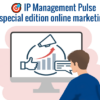How to protect your MedTech software with patents?
The MedTech industry went through hard times after the end of the COVID pandemic, but recovered in 2024 and is expected to grow again by more than 5 % annually. Therefore, the number of new especially digital products entering the market is expected to increase drastically. And companies and investors looking for sustainable economic success are trying everything to create competitive advantages, including leveraging their patent protection. This can be seen also at the rising patent application numbers for MedTech patents at the EPO, which increased from 11 thousand to nearly 16 thousand in the last decade. Nevertheless, many companies are struggling to master the challenges of patent protection for software based MedTech solutions, such as Software as medical Device (SaMD). Therefore, we invited European patent attorney Roland Pültz to our IP business talk to give an overview on the options to protect these highly profitable digital solutions.
The main questions, which companies in Europe currently have were addressed in the interview, namely:
- SaMD are products, which have a very strong software component. How can you protect such products with software patents?
- SaMD are highly regulated medical devices, which require often disclosure of information to regulatory authorities. How can you obtain patent protection under those conditions?
- Regulations and patent laws vary drastically between jurisdictions and are also still evolving. How to deal with those challenges for patent protection?
Roland Pültz explained in the interview that SaMDs generally speaking are just software applications, which are used without the medical device. They are not the operating devices itself, that you use e.g. during surgical operation, but just the software. Some examples are image analyzing and data processing, the diagnostic part from the image analyzing, where the doctors say, if there is something, that needs to be cut out or not.
Regarding the patenting of those solutions, he consults his clients on the important business perspective of patents as a prohibitive right and that you need to keep in mind not only the perspective, that you can patent something, but also need to answer what you want to prohibit your competitors from doing. This thinking style is important not only to create the suitable sphere of exclusivity by patents, but also helps to have in discussions with inventors an entrepreneurs a common business language instead of legalese. This will lead in the end to more valuable patents and reduce the risks of a malinvestment, which can in the field of patents be very expensive.
Finally, Roland Pültz explained how to deal with the regulatory issues and that there are clear rules, when you are required to disclose very specific pieces of information, which are not harming patentability in the end. Additionally, the provided information given to regulators does not always need to be disclosed, but can be kept under an NDA.
For more information please watch the full interview we made with him and contact him on LinkedIn.



